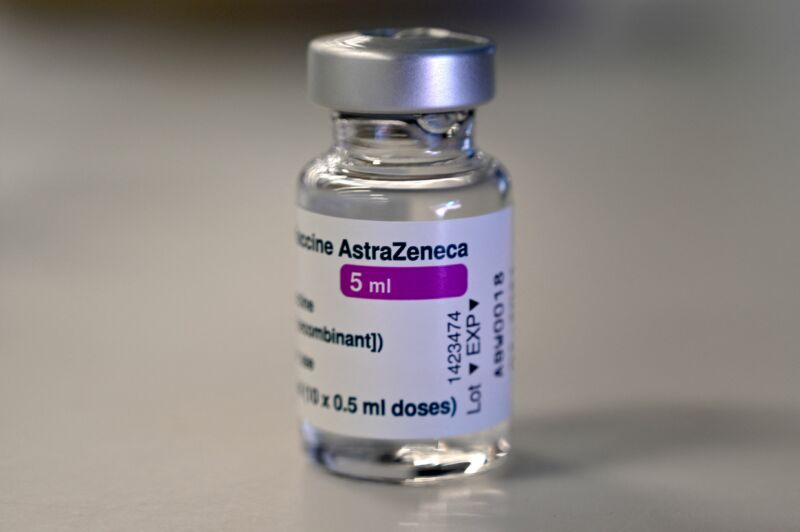Sliding numbers —
Independent experts called the earlier analysis “outdated and potentially misleading.”
Beth Mole
–

Enlarge / A vial of the AstraZeneca/Oxford vaccine is pictured at a coronavirus vaccination center at the Wanda Metropolitano stadium in Madrid on March 24, 2021.
Brushing aside a dramatic rebuke from government researchers and independent experts, AstraZeneca on Wednesday night announced that a new analysis found its COVID-19 vaccine to be 76 percent effective at preventing symptomatic COVID-19—down from the 79 percent efficacy estimate it announced in a press release Monday.
The new estimate is still high, according to an independent board of experts tasked with overseeing the vaccine’s trial and data analysis. The trial’s Data and Safety Monitoring Board (DSMB) sent a highly unusual letter to AstraZeneca soon after the Monday press release, noting that trial data it had seen during February and March meetings suggested that the vaccine’s efficacy was actually between 69 percent and 74 percent.
“The DSMB is concerned that AstraZeneca chose to use data that was already outdated and potentially misleading in their press release,” the letter stated. “The point that is clear to the board is that the [vaccine efficacy number]… they chose to release was the most favorable for the study as opposed to the most recent and most complete. Decisions like this are what erode public trust in the scientific process.”
In an equally stunning statement issued in the wee hours of Tuesday, the National Institute of Allergy and Infectious Diseases echoed the point that AstraZeneca’s Monday press release may have “provided an incomplete view of the efficacy data.”
“We urge the company to work with the DSMB to review the efficacy data and ensure the most accurate, up-to-date efficacy data be made public as quickly as possible,” the NIAID statement read.
AstraZeneca is standing by its earlier efficacy estimate, however. In the announcement Wednesday night, the company said that the latest estimate is “consistent with the pre-specified interim analysis announced on Monday 22 March 2021.”
New numbers
According to the company, the new analysis of the 32,449-person trial included 190 symptomatic cases, up from the 141 symptomatic cases included in the analysis from Monday.
Based on those 190 cases, the vaccine appeared 76 percent effective at preventing symptomatic disease occurring 15 days or more after administrating the second of two doses, which were given four weeks apart. The confidence interval for the estimate—which suggests the plausible range of efficacy based on the data—was between 68 percent and 82 percent, the company noted.
AstraZeneca added that, as before, vaccine efficacy appeared comparable across age groups, with an estimated 85 percent efficacy in people 65 years and older. The vaccine again appeared to prevent severe disease. Eight cases of severe COVID-19 were included in the new analysis, all of which were in people who received a placebo. None of the vaccinated participants required hospitalization, and the company still saw no safety concerns from the vaccine.
“The primary analysis is consistent with our previously released interim analysis and confirms that our COVID-19 vaccine is highly effective in adults, including those aged 65 years and over,” Mene Pangalos, an AstraZeneca executive, said in the Wednesday announcement. “We look forward to filing our regulatory submission for Emergency Use Authorization in the US and preparing for the rollout of millions of doses across America.”
The announcement noted that the latest results “have been presented to the independent Data Safety Monitoring Board.”

